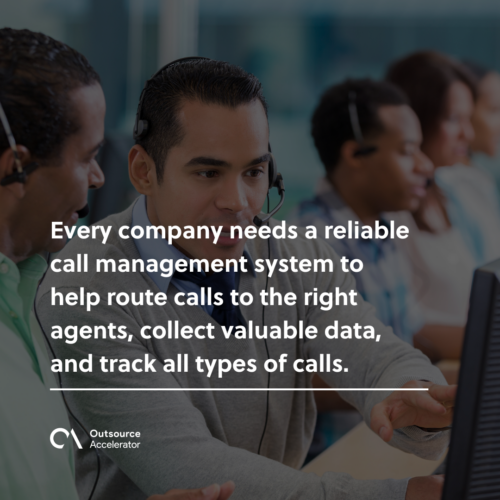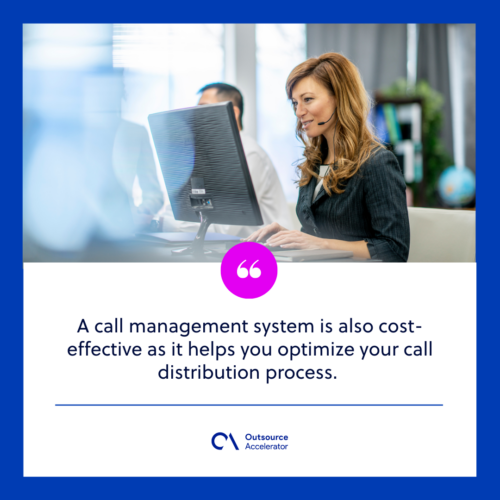How to choose the right call management system that suits your business

To have functional and successful call center operations, you shouldn’t just rely on your agents’ skills alone. Technology plays a vital role in augmenting your entire business landscape and streamlining your processes.
There are many options of technology you can integrate into your organization. However, a call management system is one crucial tech innovation that should be in every business that caters to customers via phone.
This article explains the basics of call management systems, their benefits, and how to choose the right one for your business.
A quick overview of call management
Call management involves the processes and systems used to efficiently handle incoming and outgoing calls. It includes routing calls to the appropriate agents, managing call queues, and tracking performance metrics.
Effective call management ensures quick response times, reduced wait times, and high customer satisfaction. It aims to optimize the effectiveness of handling phone calls, resulting in improved customer service.
How a call management system works
A call management system is a type of technology designed to handle incoming and outgoing calls in call centers.
Contact centers need reliable call management software to:
- Help route calls to the right agents
- Collect valuable data
- Track all types of customer calls
It is usually part of a voice-over Internet Protocol (VOIP) service. This enables your organization to better control, manage, and enhance your callers’ overall experience.
Call management systems use a specific set of predefined rules and parameters to route inbound and outbound calls through a business phone system.
It also has a call recording function that lets you monitor your call center agents’ performance. This function helps you identify which areas of your processes or services need improvement.
Call management system features
A call management system, with its diverse range of features, is essential for modern contact centers to maintain excellent customer interactions.
- Call routing. Automatic call distribution to the appropriate department or individual based on predefined rules, ensuring callers reach the right person quickly.
- Interactive voice response (IVR). Provides automated menus that interact with customer calls through voice or keypad inputs, enabling self-service options and directing calls efficiently.
- Call queuing. This manages incoming calls by placing them in a queue when all agents are busy, ensuring that no lost or abandoned calls, and providing an estimated wait time to callers.
- Call recording. Records call for quality assurance, training, and legal compliance, allowing for review and analysis of customer interactions.
- Caller ID and call screening. Identifies incoming callers and displays their information to the receiver, allowing for call screening and prioritization.
- Voicemail and voicemail to email. Stores messages from missed calls in a voicemail system and can forward these messages to email for easier access and management.
- Call analytics and reporting. Provides detailed insights and metrics on call volume, duration, wait times, and agent performance to help organizations optimize their call-handling processes.
- Automated callbacks. Offers callers the option to receive a callback instead of waiting on hold, improving customer satisfaction and reducing wait times.
- CRM integration. Integrates with CRM systems to provide agents with caller information and history, enhancing the quality and personalization of customer interactions.
- Call monitoring and whispering. Allows call center managers to listen in on live calls and provide real-time coaching to agents without the caller hearing, aiding in training and performance improvement.
- Multi-channel support. Supports communication through various channels such as phone, email, chat, and social media, providing a unified approach that helps enhance customer service.
- Conference calling. Facilitates multi-party calls, enabling efficient team collaboration for business calls and client meetings.
- Call transfer and hold. Allows agents to transfer inbound calls to another department or agent and place callers on hold while retrieving information or consulting with colleagues.

Benefits of utilizing call management software
For call centers that handle high call volumes daily, utilizing a call management system can be a viable solution to boost efficiency and productivity.
On top of that, implementing call management can also help you with the following:
Improve customer service
Through a call routing function, customers can be immediately transferred to the right agent who can handle their concerns.
A call management system also lets agents access customers’ previous call records or any information about their needs picked up by the system.
It allows your agents to give the right information or solutions to your customers’ problems or inquiries. As a result, customers are properly and quickly attended to, which, in turn, results in a positive customer experience.
Save on costs
A call management system is also cost-effective as it helps you optimize your call distribution process. With a more effective system, your agents won’t have to spend extra time handling customer service inquiries.
Manage staffing levels more effectively
A call management system collects valuable statistics and data, particularly on your peak and off-peak hours.
This can help your management team efficiently organize your staffing levels so no customers will be left waiting in long call queues during peak time. More so, no agent will also be left idling during quieter periods

What to look for in a call management systems provider
While it’s good to have a call management system, remember to choose the best call management software provider that can satisfy your business needs and criteria.
To help you pick your best choice, here are the things you should consider:
Reliability
Note that a good call management system provider should always have a reliable phone carrier presence, including automated call distribution.
Make sure to ask questions, especially in terms of how reliable their services are. A good service provider will have no qualms in answering clients’ concerns and questions.
Onboarding process and better customer service
Your chosen provider should also have dedicated customer service operations to support your team during the implementation phase of your call management system.
A reliable representative should be able to guide your team throughout this process, especially in understanding your data. Note that all your gathered information is pointless unless you turn it into actionable and attainable goals.
Industry knowledge
Make sure to choose a call management system vendor that specializes in your type of industry. Select a provider that can produce proprietary data that will compare your organization to your competitors.
This will give you benchmarks and enough confidence that your agents will better understand your goals and objectives.
Pricing
Every call management system provider will surely have its pricing values. Look for a vendor that can provide you with a pricing structure that fits your needs and call management processes.
Integrations
Do you have marketing software or a specific customer relationship management (CRM) platform in place? Ensure that your chosen call management system provider can integrate or push data into your current platform.
Lastly, remember that your call management solution should help boost your call processes and not complicate them.







 Independent
Independent




